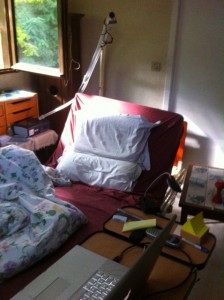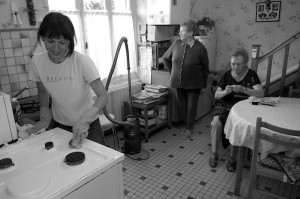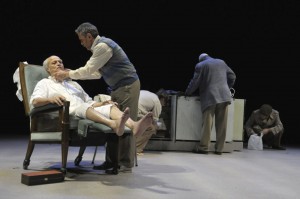With sociologists from several research centers, in Lyons and in Paris, we carried out two ethnographical studies on homecare (see references below). Actually, it would be more accurate to say that these studies address disability and care in a reciprocal manner, and approach disability as it may be captured through care, and care being shaped through contact with disability. Beside the variety of the disability, dependence or vulnerability experience, for the recipients of care as well as for their relatives and for caregivers, our research shows the new skills emerging from the confrontation with trials of heterogeneous nature and seriousness: risk of falling, feeding difficulties or difficulties in taking medicines, aggressive or dangerous behavior, restricting protective measures, isolation, necessity to leave home for institutionalized long term care, etc.
Care in practices: from individual and collective invention to situated ethics
We have been very sensitive to the individual and collective capacity for both technical and moral invention demonstrated by the continuous sense of  adaptation required in these trial situations, and also to the low recognition of this competence. It is true that it is difficult to put into words, to analyze, to teach: at the extreme opposite of administrative lists of “best practices”, it unfolds in the variety and the flexibility of the arts of making, as Michel de Certeau would say. It is a matter of attention paid to details and to unpredictable circumstances, of sensitivity to situations and to the observer’s watchfulness, or to the subtleties of a delicate taming relationship. More than to textbooks praising the art of care, this attitude sends back to the analyses by the Greek philosophers on craftiness or hunting. It also relates to this sensitivity to the relationship of the self to others that Foucault, also in line with the Greeks, already called an aestheticization of life: he didn’t mean the luxury of the dandy, but an integration of senses in the ordinary morality. Another important contribution of the ethnographical investigation is to give concrete contents to the beautiful texts which promote care in a very general ethical and political register. This sensitivity to concrete situations may also allow to take account, in a more realistic way, of the tension, the constraint and even of the violence the support and care relationships necessarily contain. Failure is a dimension of action, and its analysis does not only consist in prescribing an ideal. Starting from the observation of relationships allows, to some extent, to expand the issue of care by inverting it: would not disabled people be, in their own way, teachers in the art of living for everyone?
adaptation required in these trial situations, and also to the low recognition of this competence. It is true that it is difficult to put into words, to analyze, to teach: at the extreme opposite of administrative lists of “best practices”, it unfolds in the variety and the flexibility of the arts of making, as Michel de Certeau would say. It is a matter of attention paid to details and to unpredictable circumstances, of sensitivity to situations and to the observer’s watchfulness, or to the subtleties of a delicate taming relationship. More than to textbooks praising the art of care, this attitude sends back to the analyses by the Greek philosophers on craftiness or hunting. It also relates to this sensitivity to the relationship of the self to others that Foucault, also in line with the Greeks, already called an aestheticization of life: he didn’t mean the luxury of the dandy, but an integration of senses in the ordinary morality. Another important contribution of the ethnographical investigation is to give concrete contents to the beautiful texts which promote care in a very general ethical and political register. This sensitivity to concrete situations may also allow to take account, in a more realistic way, of the tension, the constraint and even of the violence the support and care relationships necessarily contain. Failure is a dimension of action, and its analysis does not only consist in prescribing an ideal. Starting from the observation of relationships allows, to some extent, to expand the issue of care by inverting it: would not disabled people be, in their own way, teachers in the art of living for everyone?
The management of disability or dependence as a collective creation
We are thus coming to the end of long inquiries on homecare, which have been the basis for the publication of two reports. The point here is not to summarize 600 pages. What I am rather attempting to do in this article is to pursue this work with a precise theme, that of fiction, which allows to consider it from a different angle: can the collective management of disability or dependence by the “concerned people”, according to the fine expression of John Dewey, be interpreted as a creation —a creation that would be undertaken not only by the disabled people themselves (better named handicapables), but also by close relatives, caregivers, institutions, or, to put it more accurately, by the whole, plural collective willy-nilly formed by those who experience such situations? How could one make people do something they did not ask for or do not show interest in? Or conversely, from the point of view of the people receiving care, how could one make professionals adapt to a case that is always  particular, and revise their standards or their habits? Providing care implies the uncertain installation of a relationship, a common space in which the care relationship can “take place”.
particular, and revise their standards or their habits? Providing care implies the uncertain installation of a relationship, a common space in which the care relationship can “take place”.
Our development borrows the notion of fiction from Paul Ricœur, whose very rich reading may be declined on several levels. At first, it allows to partially rephrase the way we have conducted the investigation: which means, not starting from the existing medical or social definitions of disability, whether drawing on the physicians’ knowledge or on the other’s view, but from what people themselves are doing of their disability. First sense, thus, the fiction-narrative, for us the researchers, but also for the disabled persons: how to report these experiences? For our part, two of us have stayed for example several whole days with disabled persons, especially people with physical impairments, in order to observe the series of trials that life imposes on them; then, in other cases this time concerning rather mental or psychic disabilities, we have followed the “file” these cases have become on the long term, in the quasi administrative sense of the term: the series of administrative actions, social benefits, treatments and care that intersect along the way, with the diagnoses, the judgments, the decisions they imply, and especially, in a less institutional way, the continuous series of small choices, appreciations, and hardly formulated impressions which may nevertheless decisively rework the course of events.
On singular and shared experiences
Fiction, in this first narrative sense, is a way of reaching deeper truths via the singular: the devil is in the details. It is worth paying close attention to specific situations, particular problems. Like in novels, they provide an understanding of completely singular truths, which, by this peculiarity, directly echo experiences that are on the contrary very commonly shared. Specific cases bring contents, meaning to general feelings or truths, of which they are less the application than the material. When it comes to disability in daily life, this is much stronger than what trendy expressions such as “real-life experience”, “the feeling” suggest. All these words are overly focused on personal psychology and act as if disability was given, and if the issue was a matter of its acceptance by the disabled person. This is a rather awkward way of talking about it: the question here really is how a disabled person and close relatives forge disability as it is for them, how they rephrase and reinvent it. Or, to say it in more learned and more accurate terms: how they perform it. The idea of fiction is meant here in its strongest sense: disability is set on a common stage. Fiction means neither unreality, nor a pure product of imagination. It implies making, that some work has been done to produce reality by other means, every day, as the unpredictable trials that they continuously meet occur, but also little by little on a longer term, through the roles they create, the relationship they built, the collective intrigue they gradually invent.
The creation of a common world
This second sense of the word fiction leads us to the description of a collective narrative work, to intrigue staging, and to the dramatization of relationships. Extremely present work in care: we may think, this time to follow in Erving Goffman’s footsteps, of all the actor-like gestures, the smiles, the liveliness  needed to create a pleasant atmosphere or to facilitate care in delicate situations, the small lies of omission about the person’s condition, the ways to avoid making them lose face, the art of not seeing what should not be seen, of knowing how to talk about other subjects when necessary, even to use of tricks, more or less with the others’ consent, so that a relationship filled with difficult moments takes place at best. The idea of fiction helps to see role-playing games, the use of gestures, bodies, expressions, ways to behave and to speak, and more widely the fact that doing so delineates a scene, an accepted frame, in which everyone finds more easily a place than in a one at the time interaction. Finally, this technique, in the theatrical sense, is of course reciprocal, which means that beyond the words and the acts, somewhat like in a couple, it allows the gradual installation of a common stage which makes both partners the actors of their own relationship. This also allows for snags, for a less naive relationship, which may include frictions, which does not dissolve at the first sign of irritation, which tolerates the quarrels or the annoyances, because the common fiction has created a duration that forms the basis of a trusty relationship.
needed to create a pleasant atmosphere or to facilitate care in delicate situations, the small lies of omission about the person’s condition, the ways to avoid making them lose face, the art of not seeing what should not be seen, of knowing how to talk about other subjects when necessary, even to use of tricks, more or less with the others’ consent, so that a relationship filled with difficult moments takes place at best. The idea of fiction helps to see role-playing games, the use of gestures, bodies, expressions, ways to behave and to speak, and more widely the fact that doing so delineates a scene, an accepted frame, in which everyone finds more easily a place than in a one at the time interaction. Finally, this technique, in the theatrical sense, is of course reciprocal, which means that beyond the words and the acts, somewhat like in a couple, it allows the gradual installation of a common stage which makes both partners the actors of their own relationship. This also allows for snags, for a less naive relationship, which may include frictions, which does not dissolve at the first sign of irritation, which tolerates the quarrels or the annoyances, because the common fiction has created a duration that forms the basis of a trusty relationship.
A self-invention
Finally, far beyond this, to speak about fiction means to open up to the idea that disability is creative. By saying that a disabled person creates the fiction of his/her disability we show that there is no fixed definition, that disability is plural, that it is what one makes of it – even and particularly if, like in good fiction, it does not mean that one can do anything. Here is a brief example: two persons that we had contacted through the same association have the same disease, but make quite a different thing of their disability. The first one, a tetraplegic person, has entirely constructed his life so as not to be disabled, that is, living “like” everyone – not in denial of his condition or escaping from reality, but on the contrary in a kind of over-control of disability. Confine it, do all that it is necessary to take care of it, and then be able to be a draughtsman, a husband, a friend, in short anything but his own disability. He thus organized everything, his house, his relationship with the assistants, his work, etc., so that from 7 am to noon taking care of him “as” a disabled person is all that matters (moreover his wife works mornings outside), and thereby from 1 pm till the evening, he works, he stays with his wife, he lives his life. The importance of the word fiction is clear: not living like everyone in the sense of “as if”, of a fiction in the weak sense of the word, opposite to reality, or even denying reality, but “like” in its strong sense, living “like a man”, and not being reduced to his disability-condition. The other person, an old lady, paralyzed, with serious difficulties of all sorts regarding movement, painful treatments, pain, has exactly the inverse attitude, from the point of view of care: taking care of nothing (“I abandon my body to you”, she says!), delegating everything in the organization of her disability, but transferring everything to the relationships. She is always cheerful, she jokes with everyone, speaks with one about her child, gives a little present to the other one, so that she is the favorite of the homecare service, and “her” disability has somehow become something like the crossroads of thousands of emotional relationships she carefully maintains, and which maintain her. It is another way to overcome the experience of disability and produce it.
A performative fiction
Another fiction, another way of “experiencing” one’s disability: not in the sense of psychologically bearing a given state, but of relying on constraints in order to make it the theater of operations of a way of being. Here we are dealing, with the last sense of “fiction”, its strong sense that questioned us during our inquiries. To me, this sense highlights a creative dimension of disability by insisting on the ontological power of the progressive institution of a shared framework, which makes the partners be one to the other. Ricœur’s striking analysis of fiction is quite adapted to disability: “as” does not mean “as if” or ”pretending to“, but “being in the capacity of”. “As if” is the fiction in the common sense of the term, the fiction which is a bit deceitful. For instance, I treat someone with a disability as if he/she were not different. It is more like political correctness. According to Ricœur, this is representative fiction. What is needed is ontological fiction. Treating this person not “as if” there were nothing to notice, but “as” a human being. I see the human being in him/her. The fiction then becomes performative, creative: for example about the requirement to respect autonomy, which is often difficult to reconcile with the state of the persons or with their protection. Instead of thinking in terms of a more or less lame compromise, seeing autonomy as a productive fiction helps to understand things in a more effective and fairer way: the very fact of seeing the disabled person as autonomous, as a person who is like the others, is what can help him/her to be autonomous. That means that this fictitious autonomy, in the strongest sense of the term, is produced by the collective of carers, close relatives and the disabled person him/herself, and thanks to this fiction of autonomy the person becomes autonomous, through a collective.
The fictional framing allows making the carer partially hold the autonomy of the cared person in his/her stead: treating a vulnerable person as an autonomous one enables to maintain what is no longer entirely present. Curious autonomy, then, by proxy: there seems to be a contradiction in terms. But it is the strength of fiction. It makes autonomy exist, an autonomy that in order to exist must be supposed and born by others. Today, the ethical and political stake of the care relationship lies in these fragile moments, in this invention of an autonomy expanded to a collective. Nothing less is at play than the creative dimension of an art of accompanying the dependencies and the vulnerabilities, not only in a daily performance but also socially, for us all.
Hennion Antoine, Guichet Franck, Paterson Florence, Le Handicap au quotidien. La personne, les proches, les soignants : sept récits d’expériences à domicile, HAS/CNSA, UNA/CSI, 2009, 259 p.
Hennion Antoine, Vidal-Naquet Pierre, Guichet Franck et al., Une ethnographie de la relation d’aide : de la ruse à la fiction, ou comment concilier protection et autonomie. Treize récits de cas, MiRe (DREES), CSI, MINES-ParisTech-CNRS/Cerpe, 2012, 352 p.
References
de Certeau Michel, L’Invention du quotidien Tome 1. Arts de faire, Paris, Gallimard, 1980.
Dewey John, The Public and its Problems. New York, Holt, 1927.
Foucault Michel, The History of Sexuality. Vol. 2: The Use of Pleasure. London, Penguin, 1992 [1984].
Goffman Erving, Presentation of Self in Everyday Life. Garden City, NY, Anchor Doubleday, 1959.
Ricœur Paul, Time and narrative. Vol. 1, Transl. by K. McLauglin & D. Pellauer, Chicago, The University of Chicago Press, 1984.
Ricœur Paul, The Just. Transl. by D. Pellauer, Chicago, The University of Chicago Press, 2003 [2001].
Photo #1: David’s bedroom. Things within reach. September 2013. Photo: Florence Paterson.
Photo # 2: Assistance at home. © Thierry Mezerette / Ville de Rezé. Photo: Thierry Mezerette.
Photo # 3: Invisibles. Written and directed by Nasser Djemaï. Compagnie Nasser Djemaï. Photo: Philippe Delacroix.

